But ripple detection in humans remains challenging. Here we introduce a simulation approach in @natcomms.nature.com as common ripple detectors mainly pick up 1/f noise and not genuine oscillations
👇
www.nature.com/articles/s41...
#neuroskyence

But ripple detection in humans remains challenging. Here we introduce a simulation approach in @natcomms.nature.com as common ripple detectors mainly pick up 1/f noise and not genuine oscillations
👇
www.nature.com/articles/s41...
#neuroskyence
In this pre-reg study, our core claim was that we don’t just learn stimulus-reward. We infer hidden context and that inference re-wires attention and neural state space on the fly.
1/8

In this pre-reg study, our core claim was that we don’t just learn stimulus-reward. We infer hidden context and that inference re-wires attention and neural state space on the fly.
1/8
@fbmh-uom.bsky.social funded by @royalsociety.org. Interested in human memory, VR, and neuroimaging? This is the project for you 🧠
tinyurl.com/memoryVRPhD
Application deadline January 31st!
@fbmh-uom.bsky.social funded by @royalsociety.org. Interested in human memory, VR, and neuroimaging? This is the project for you 🧠
tinyurl.com/memoryVRPhD
Application deadline January 31st!
If you know great candidates interested in attention, memory transformation and EEG, please help spread the word:
Project (ReDAS) -> cimcyc.ugr.es/en/informati...
Job offer -> cimcyc.ugr.es/en/informati...

If you know great candidates interested in attention, memory transformation and EEG, please help spread the word:
Project (ReDAS) -> cimcyc.ugr.es/en/informati...
Job offer -> cimcyc.ugr.es/en/informati...
Thanks to @lmumuenchen.bsky.social for the nice coverage: www.lmu.de/en/newsroom/...
Thanks to @lmumuenchen.bsky.social for the nice coverage: www.lmu.de/en/newsroom/...
authors.elsevier.com/sd/article/S...
I am extremely happy to share this new review article in elife on #Traveling_Waves!
@erc.europa.eu
@upcite.bsky.social
elifesciences.org/articles/106...

I am extremely happy to share this new review article in elife on #Traveling_Waves!
@erc.europa.eu
@upcite.bsky.social
elifesciences.org/articles/106...

We show that rhythmic light stimulation produces multiplexed oscillatory responses at fundamental and harmonic frequencies that are spatially, temporally, and functionally distinct.
Read on for the details [1/6]
www.biorxiv.org/content/10.1...
#neuroskyence

We show that rhythmic light stimulation produces multiplexed oscillatory responses at fundamental and harmonic frequencies that are spatially, temporally, and functionally distinct.
Read on for the details [1/6]
www.biorxiv.org/content/10.1...
#neuroskyence
A neural state space for episodic memories
www.sciencedirect.com/science/arti...
#neuroskyence #psychscisky #cognition 🧪

A neural state space for episodic memories
www.sciencedirect.com/science/arti...
#neuroskyence #psychscisky #cognition 🧪

Happy to share a new preprint from my postdoctoral work with Jed Meltzer, @drjenryan.bsky.social, and @rosannaolsen.bsky.social
Paper: doi.org/10.1101/2025...

Happy to share a new preprint from my postdoctoral work with Jed Meltzer, @drjenryan.bsky.social, and @rosannaolsen.bsky.social
Paper: doi.org/10.1101/2025...
www.biorxiv.org/content/10.1...

www.biorxiv.org/content/10.1...
New paper by @selmalugtmeijer.bsky.social showing that neural states get longer as people age. #PsychSciSky
nature.com/articles/s42003-025-08792-4

New paper by @selmalugtmeijer.bsky.social showing that neural states get longer as people age. #PsychSciSky
nature.com/articles/s42003-025-08792-4
Ever noticed how most people (without realizing it) tend to see the left side of space a bit more strongly? In our new study, we show that this subtle quirk—called pseudoneglect—is linked to the asymmetry of putamen, a deep subcortical structure.
www.biorxiv.org/content/10.1...

Ever noticed how most people (without realizing it) tend to see the left side of space a bit more strongly? In our new study, we show that this subtle quirk—called pseudoneglect—is linked to the asymmetry of putamen, a deep subcortical structure.
www.biorxiv.org/content/10.1...
@thechbh.bsky.social #neuroskyence

@thechbh.bsky.social #neuroskyence
www.jneurosci.org/content/earl...
www.jneurosci.org/content/earl...
Happy to share our last work on #attention_rhythms, co-led by @cogsenoussi.bsky.social & former Dugué Lab PhD student @lauriegalas.bsky.social, and in collab with Niko Busch 🎉
@upcite.bsky.social | @erc.europa.eu | #neuroskyence
www.biorxiv.org/content/10.1...

Happy to share our last work on #attention_rhythms, co-led by @cogsenoussi.bsky.social & former Dugué Lab PhD student @lauriegalas.bsky.social, and in collab with Niko Busch 🎉
@upcite.bsky.social | @erc.europa.eu | #neuroskyence
www.biorxiv.org/content/10.1...
“Investigating dreams by strategically presenting sounds during REM sleep to reactivate waking experiences”
authors.elsevier.com/c/1lWFU6TBG5...

“Investigating dreams by strategically presenting sounds during REM sleep to reactivate waking experiences”
authors.elsevier.com/c/1lWFU6TBG5...
📢 New paper from: Anna Guttesen (annaavali.bsky.social), Marcus Harrington (@harrington-mo.bsky.social), Gareth Gaskell (mggaskell.bsky.social), & Scott Cairney (sacairney.bsky.social)
www.sciencedirect.com/science/arti...

#neuroskyence #cognition #psychscisky #neurojobs
jobs.york.ac.uk/vacancy/lect...
#neuroskyence #cognition #psychscisky #neurojobs
jobs.york.ac.uk/vacancy/lect...
We investigated how hippocampal and cortical ripples support memory during movie watching. We found that:
🎬 Hippocampal ripples mark event boundaries
🧩 Cortical ripples predict later recall
Ripples may help transform real-life experiences into lasting memories!
rdcu.be/eui9l

We investigated how hippocampal and cortical ripples support memory during movie watching. We found that:
🎬 Hippocampal ripples mark event boundaries
🧩 Cortical ripples predict later recall
Ripples may help transform real-life experiences into lasting memories!
rdcu.be/eui9l
👉 www.jobs.manchester.ac.uk/Job/JobDetai...
Please spread the word! 📣

👉 www.jobs.manchester.ac.uk/Job/JobDetai...
Please spread the word! 📣

